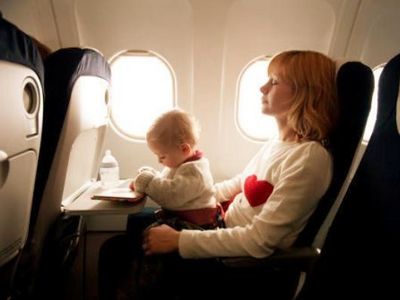Abidemi: So Jeremy, you mentioned earlier that you've been back to Canada with your baby. How was that experience?
阿比德米:杰里米,你之前说过你带着你的宝宝回了加拿大。那个经历怎么样?
Jeremy: Well, I mean, until you fly with a toddler, you really never get to appreciate all of those times that you flew across the ocean, you know, watching movies or reading magazines or just sleeping on the flight because those days are over.
杰里米:嗯,在和蹒跚学步的孩子一起坐过飞机以后,你才会珍惜那些看电影或看杂志或睡觉度过的飞行时光,因为那些日子已经结束了。
Abidemi: Wow.
阿比德米:哇哦。
Jeremy: I mean, it's not that bad but when you're on the plane, you say, "Never again." I remember about halfway into a 10-hour trans-Pacific flight, I thought, "Well, I can maybe do this every three years but not more than once a year for sure."I mean, first of all, our boy was bigger than most children for his age. So he was about one year old. And, you know, they have these bassinets that you're allowed to put your child in and, you know, the baby will hopefully sleep for a while. So the stewardess sets up the bassinet, we're all ready to put him in there and then she says, "How old is he?" And he was 12 kilos, and this was for 11.5 maximum.
杰里米:虽然情况没有那么糟糕,不过就带孩子坐飞机来说,我想说“永远不想再来一次”。我们回加拿大要坐飞机飞越太平洋,要飞行10个小时,我记得飞行途中,我想“我也许可以每三年带孩子回一趟加拿大,一年绝对不能超过一次”。我的意思是,首先,我儿子比同龄孩子的个子高。他大概一岁。飞机上有婴儿摇篮,可以把孩子放在里面,希望孩子能在里面睡一会儿。空姐会把摇篮安装好,我们已经准备把孩子放在里面了,这时空姐说,“他多大了?”他已经12公斤了,摇篮最大承重是11.5公斤。
Abidemi: Oh no.
阿比德米:哦不。
Jeremy: And they wouldn't let us put him in there, so they had to take the whole thing apart and basically, we had to find some way to have him sleep on our laps for the next nine hours.
杰里米:所以他们不让我们把孩子放在里面,然后他们把摇篮拆掉了,所以剩下的九个小时,我们只能想办法让他在我们的腿上睡觉。
Abidemi: Oh, wow.
阿比德米:哇哦。
Jeremy: I mean, you know, one-year old like to crawl around. They like to scream, they like to cry. Other people on the flight don't like that so much. So, you know, it's basically every minute of silence you just savor and just pray that this will keep going, and it never does. But, you know, once he falls asleep and the plane is quiet and they turn off the lights then, you know, it's okay. But it's too long. It's too long for a one-year old. So I can maybe manage it once a year but that's about it.
杰里米:你知道,一岁左右的孩子喜欢到处爬。他们喜欢喊叫,也会经常哭。飞机上的其他人对这点感到不满。你想享受安静的时刻,希望这种安静能够持续下去,可是经常事与愿违。不过,他睡着以后,飞机上就安静了,他们会把灯关掉,这样很好。不过飞行时间太长了。对1岁的孩子来说,时间太长了。也许一年一次我还可以应付。
Abidemi: I remember my sister, she has two kids and she told me a story a few years back when one of her daughters was still a toddler, and they went to Disneyland from Canada. And she said it was just horrible, and they would never do it again. And I just smiled. I didn't have that experience. I was just thinking, "What could be so bad about it?" But hearing your story now, wow, I can only imagine.
阿比德米:我姐姐有两个孩子,她和我说过几年前的一个经历,当时她其中一个女儿还是蹒跚学步的孩子,他们从加拿大坐飞机去迪斯尼乐园玩。她说那是次可怕的经历,他们不想再经历一次。当时我只是笑笑。我还没有那种经历。我当时在想,“怎么会这么糟?”不过听了你的经历以后,我可以想象了。
Jeremy: Well, I think that – actually most people, most passengers on the flight are usually quite understanding. And I think it's just, you know, in the parents' head that everybody is judging them, everybody is looking at them. Because, you know, I get so worried about what other people are thinking, that inconveniencing others that I just work myself up so much, and my wife is the same way. But, you know, talking – actually, we did have people say to us like, "Don't worry about it." They will just go out of their way to say, "Oh, what a cute baby" and stuff like that. So I think people were kind of aware of how stressful it is for parents. And they just – some people actually make an effort to make parents feel like everybody is not silently judging them or maybe not even silently.
杰里米:嗯,其实飞机上的大部分乘客都能理解。不过在父母看来,所有人都在评价他们,所有人都在关注他们。因为我非常担心别人的想法,给其他人带去不便让我很不安,我妻子也是一样。有一些乘客跟我们说,“不用担心”。他们会贴心地跟我们说,“哦,这孩子好可爱啊”之类的话。我认为,人们意识到这种情况会让孩子的父母非常紧张。一些人会努力让父母感觉,没有人在默默地评价他们,或者没有人在评价他们。
Abidemi: Okay. Not saying anything. If you had an advice, one advice to give to a parent that would travel with that child in the future, what would you tell them?
阿比德米:好。什么都不说。如果让你给以后要带孩子旅行的家长提建议,你会说什么?
Jeremy: My best advice is if you can fly in the morning. So after baby wakes up and you have your breakfast and your flight is maybe at, I don't know, 9:00 or 10:00 in the morning, I think that works out if it's a, say, a 10-hour flight because you'll land it'll be probably around bedtime, like his normal bedtime. The first time we did it, the flight was in the late evening. So basically, he'd been up all day. And then there was another 10 hours on top of that. So, you know, when we landed, the readjustment to his normal schedule was really, really difficult. But when we flew in the morning and it was a 10-hour flight, when we landed, he just basically went to sleep like a normal schedule. So that's a small thing but it really makes a big difference.
杰里米:我能给的最好的建议是,尽量在早上坐飞机。孩子起床以后吃早餐,你们的航班定在上午9点或是10点左右,如果要飞行10个小时,这个时间很合适,因为飞机降落时差不多也到了孩子的睡觉时间。我们第一次带孩子坐飞机坐的是深夜航班。他已经玩一整天了。然后还要再坐10个小时的飞机。我们降落以后,再调整他的作息时间非常困难。如果上午坐飞机,经过10个小时的飞行以后,降落时间正好是他正常作息的睡眠时间。虽然这是小事,不过会产生很大的影响。
Abidemi: Thank you.
阿比德米:谢谢。

译文属可可原创,仅供学习交流使用,未经许可请勿转载


